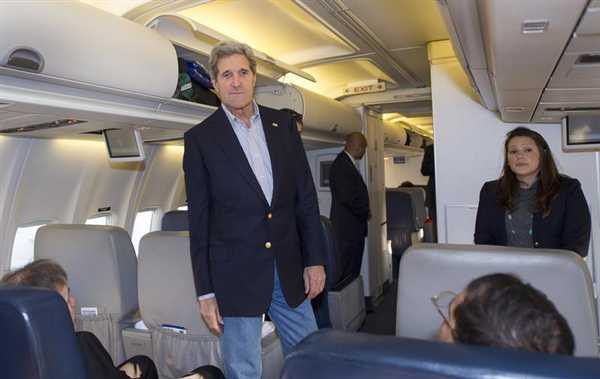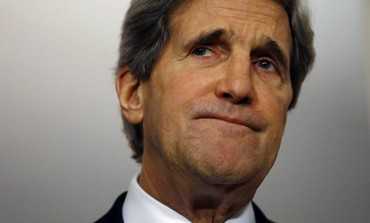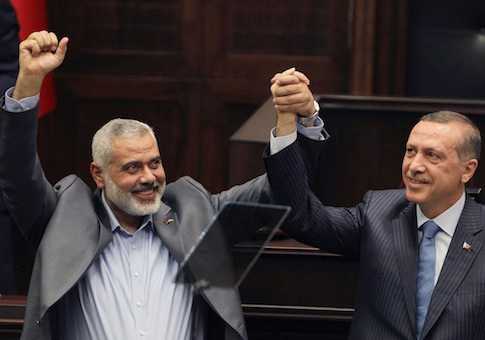
REUTERS/Paul J. Richards/Pool
U.S. Secretary of State John Kerry talks to reporters after finding out that the aircraft had a mechanical failure before take off, at the Andrews Air Force Base in Maryland April 6, 2013.
By Arshad Mohammed, Reuters
U.S. Secretary of State John Kerry will press Turkey on Sunday to quickly normalize relations with Israel, keep its border with Syria open to refugees and improve ties with Iraq, a senior U.S. official said.
Kerry arrived in Istanbul some two weeks after U.S. President Barack Obama brokered a rapprochement between Turkey and Israel, whose relations were shattered by the killing of nine Turkish citizens in a 2010 Israeli naval raid on a Gaza-bound flotilla.
The rapprochement could help regional coordination to contain spillover from the Syrian civil war and ease Israel’s diplomatic isolation in the Middle East as it faces challenges posed by Iran’s nuclear program.
Despite Obama’s having pulled off a diplomatic coup on March 22 – a three-way telephone call with the Israeli and Turkish prime ministers, who had not spoken since 2011 – Washington has some concerns that Turkey might be backtracking on the deal.
Israel bowed to a long-standing demand by Ankara, once its close strategic partner, to apologize formally for the deaths aboard the Turkish vessel Mavi Marmara. It was boarded by Israeli marines who had intercepted a flotilla challenging Israel’s naval blockade of the Palestinian-run Gaza Strip.
Israeli Prime Minister Benjamin Netanyahu’s office said he had agreed to conclude an agreement on compensation and that he and Turkish Prime Minister Tayyip Erdogan agreed to normalize ties, including returning their ambassadors to their posts.
A senior U.S. official told reporters traveling with Kerry that he “will encourage Turkey to expeditiously implement its agreement with Israel and fully normalize their relationship to allow for deeper cooperation between the two countries.”
While the official denied the United States was worried the Turkish government might be backing away from the deal, another U.S. official earlier this week said Washington was concerned.
Kerry will also raise Syria and Iraq during his talks on Sunday with Erdogan and Turkish Foreign Minister Ahmet Davutoglu in Istanbul, his first stop on a 10-day trip to the Middle East, Europe and Asia.
One of the underlying motivations for the Israeli-Turkish rapprochement, at least on the Israeli side, has been a desire to secure allies in the region as the Syrian civil war churns into its third year.
Kerry’s message in Istanbul will include “reiterating the importance of keeping the borders open to Syrians fleeing from violence,” the senior U.S. official told reporters with Kerry.
The official said this was a reference to reports, which Turkey denied on March 28, that it had rounded up and deported hundreds of Syrian refugees following unrest at a border camp.
Witnesses said hundreds of Syrians were bussed to the border after clashes in which refugees in the Suleymansah camp, near the Turkish town of Akcakale, threw rocks at military police, who fired teargas and water cannon.
Turkey’s foreign ministry said 130 people, identified as being “involved in the provocations,” crossed back into Syria voluntarily, either because they did not want to face judicial proceedings or because of repercussions from other refugees.
The incident highlighted the strain that the exodus from Syria’s civil war is placing on neighboring states.
Since the revolt in Syria began two years ago, more than 1.2 million Syrians fleeing violence and persecution have registered as refugees or await processing in neighboring countries and North Africa, according to U.N. figures.
They include 261,635 in Turkey, mostly staying in 17 camps, many of them teeming.
Kerry also plans to nudge Turkey to improve ties with Iraq, which is troubled by efforts by its autonomous Kurdistan region, where ethnic Kurds have administered their affairs since 1991, to sell energy to Turkey.
The Iraqi central government argues that this would deprive it of oil revenues that belong to Iraq as a whole.
via Kerry to press Turkey on Israel ties, Syrian border, Iraq – World News.





